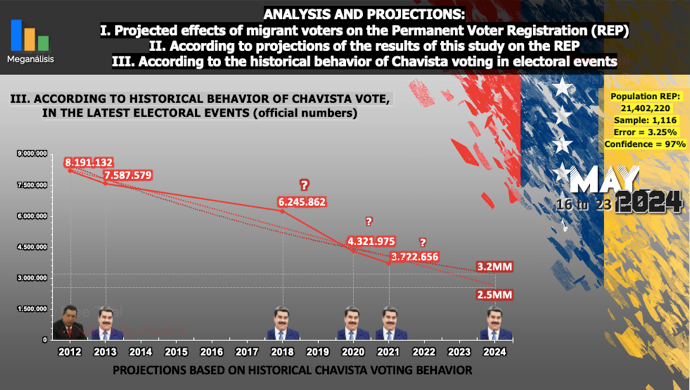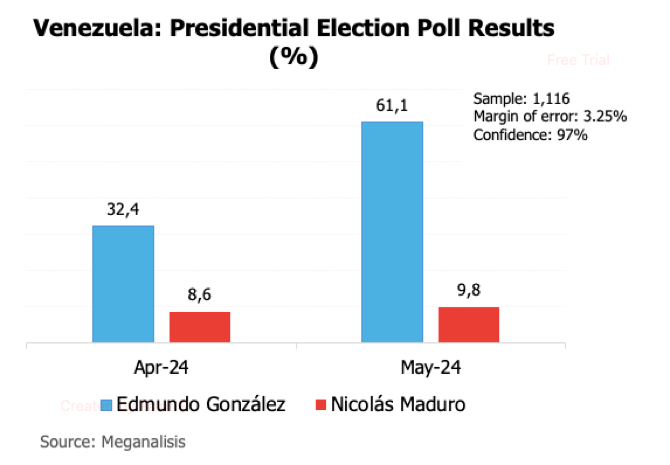





|
Tweet
|
|
|
“Between conflict and submission, I choose conflict (...) conflict is an inevitable part of any great human endeavor.” - Cayetana Álvarez de Toledo
Introduction In Venezuela, the rejection of Nicolás Maduro’s totalitarian regime has reached unprecedented levels, despite the censorship and repression imposed by his administration. The need for political change has become a collective will among the population. María Corina Machado, the winner of last October’s opposition primaries, has channeled this sentiment, which is increasingly strong in a population yearning for a different future. Machado’s Transformative Leadership Machado has redefined leadership amid the severe crisis facing the country. Her ability transcends conventional approaches by establishing deeper connections with people and inspiring them with a long-term vision. Machado’s leadership also produces an emotional change in people, a fundamental element for opening new perspectives and solutions. She not only makes effective decisions but also motivates belief in the desired change. This emotional aspect drives people to follow and trust her, believing that she will lead them towards better days and reunions with loved ones who emigrated in search of a better quality of life, as well as to help those who stayed. The Authoritarian Regime’s Grip The authoritarian regime, led by the “Band of Five” (Diosdado Cabello, Cilia Flores, Nicolás Maduro, Vladimir Padrino López, and Jorge Rodríguez), maintains a firm grip on all the country’s institutions through repressive and undemocratic tactics. However, this coercive control does not translate into genuine support from the population. The widespread support that once sustained Hugo Chávez and, to a lesser extent, Maduro has significantly eroded. This erosion reflects the deep discontent of Venezuelans, overwhelmed by unfulfilled promises, the constant deterioration of their quality of life, and the systematic plundering of national resources. Overcoming Polarization and Embracing Change Polarization, once a defining feature of Venezuela’s political landscape, is increasingly becoming a thing of the past. The population, exhausted by years of confrontations and divisions, now seeks change, regardless of Machado’s personal or economic background. Overcoming resentment, envy, and hatred may catalyze the nation’s transformation, leaving 21st-century socialism behind. Risks of Electoral Manipulation Despite calls for free, fair, and competitive elections, there is a latent risk that the Maduro regime will resort to extra-electoral methods to distort or invalidate the results. This potential manipulation demonstrates their fear of leaving Miraflores Palace. Throughout Venezuela’s history, those in power have repeatedly prioritized maintaining control over respecting the popular will, and this cycle seems poised to repeat itself. However, the Venezuelan people are motivated not to let victory be snatched away. Popular Discontent and Vigilance Popular discontent is palpable despite the regime’s propaganda and media manipulation. The people are interested not only in voting but also in staying vigilant against possible electoral fraud. This active involvement in the electoral process indicates that the regime will not easily deceive Venezuelans. The Regime’s Rejection of Democratic Transition Unfortunately, there are no signs that the Band of Five is willing to transition to democracy. On the contrary, increased rhetoric and propaganda reveal a desperate attempt to maintain control at any cost. This rejection of a democratic transition exacerbates the crisis and further distances the population. Challenges and Resilience The current situation poses a complex challenge for Venezuela’s democratic society. As the government grows more threatening and repressive, the struggle for peaceful and democratic change becomes more difficult. Nonetheless, we should not underestimate the resilience of the Venezuelan people. History shows that oppressive regimes cannot indefinitely stifle the desire for freedom and justice. Regional Context and Precedents Latin America is full of examples of authoritarian regimes that were ultimately forced to relinquish power. From the fall of military dictatorships to the dissolution of dictatorial governments, the region has demonstrated that change is possible. Venezuela might be heading towards a similar destiny, where internal and external pressures force the regime to give in. The Upcoming Elections and International Support The elections on July 28 could be the turning point needed for decisive political change in Venezuela. However, the path to this goal is filled with formal, repressive, and political obstacles that must be overcome. The international community and internal actors must work together proactively to ensure this process is fair and transparent. Unlike in the past, the Band of Five lacks the political will to manage the situation effectively. This lack of commitment could be key to the regime’s eventual collapse. Comparing the Band members to historic Chavista figures reveals a significant gap in capacity and vision for the common good. They are operators of the country’s plunder. Conclusion As mentioned, Venezuela is at a critical juncture in its history. The desire for change is strong, the discontent is palpable, and conditions are ripe for a transition. However, this process will not be easy or quick. The international community must support Venezuelans struggling for a better future, ensuring their voices are heard and their rights respected. The path to democracy is arduous, but with determination and unity, Venezuela could find its way toward a new dawn, led by María Corina Machado and Edmundo González. |


